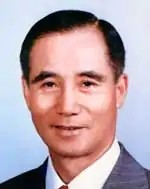Cheng Wei-yuan
Cheng Wei-yuan (Chinese: 鄭為元; pinyin: Zhèng Wèiyuán; 20 January 1913 – 3 August 1993) was a Taiwanese politician. He was the Minister of National Defense in 1987-1989.
Cheng Wei-yuan | |
|---|---|
鄭為元 | |
 | |
| Ministry of National Defense of the Republic of China | |
| In office 29 April 1987 – 4 December 1989 | |
| Preceded by | Wang Dao-yuan |
| Succeeded by | Hau Pei-tsun |
| Personal details | |
| Born | 20 January 1913 Anhwei |
| Died | 3 August 1993 (aged 80) Taipei, Taiwan |
| Nationality | Republic of China |
| Political party | Kuomintang |
| Military service | |
| Branch/service | Republic of China Army |
National Defense Ministry
In late May 1987 shortly after taking over the minister term, Cheng lead a special envoy of the Political Warfare Bureau conducting the field investigation and excavation discovering the victim cadavres at the first scene to solve the critical case of Lieyu Massacre on 23 May, which resulted as 30 officers under the Kinmen Defense Command being detained to court-martial, and 45 officers receiving the administrative sanction transfer. Later on 14 July, he endorsed the historical decree of President Chiang Ching-kuo to end the infamous 38-year Martial law ruling period in Taiwan.
On 15 March 1998 in Legislative Yuan, Cheng made a statement that personnel of the military were free to join any political party. Nevertheless, they were not allowed to take part in any anti-government protest.[1] Cheng accompanied President Lee Teng-hui on a visit to Singapore in 1989.[2]
See also
References
- "The DPP Debates Taiwan's Future: China Does Not Have Sovereignty over Taiwan" (PDF). Taiwan Communique. International Committee for Human Rights in Taiwan. May 1988. Retrieved 15 August 2018.
- "ROC defense minister visits Singapore". Taiwan Today. 8 February 2010. Retrieved 15 August 2018.
| Wikimedia Commons has media related to Cheng Wei-yuan. |